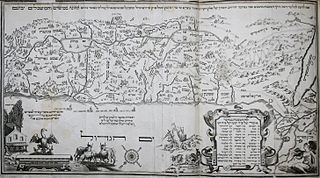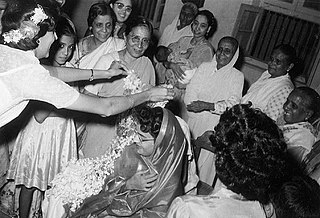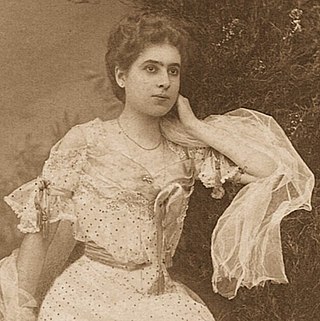Related Research Articles

The Bene Israel, also referred to as the "Shanivar Teli" or "Native Jew" caste, are a community of Jews in India. It has been suggested that they are the descendants of one of the Ten Lost Tribes via their ancestors who had settled there centuries ago. Starting in the second half of the 18th century, after they were taught about normative Sephardi Judaism, they migrated from villages in the Konkan region where they had previously lived to nearby cities throughout British India—primarily to Mumbai where their first synagogue opened in 1796 but also to Pune, Ahmedabad, and Karachi, where they gained prominent positions within the British colonial government and the Indian Army.

Cochin Jews are the oldest group of Jews in India, with roots that are claimed to date back to the time of King Solomon. The Cochin Jews settled in the Kingdom of Cochin in South India, now part of the state of Kerala. As early as the 12th century, mention is made of the Jews in southern India by Benjamin of Tudela.

The Beta Israel, also known as Ethiopian Jews, are a Jewish community that lived for centuries in the area of the Kingdom of Aksum and the Ethiopian Empire, which is currently divided between the modern-day Amhara and Tigray regions of Ethiopia. Most of the Beta Israel community immigrated to Israel in the late 20th century.
The history of the Jews in India dates back to antiquity. Judaism was one of the first foreign religions to arrive in the Indian subcontinent in recorded history. Desi Jews are a small religious minority who have lived in the region since ancient times. They were able to survive for centuries despite persecution and antisemitic inquisitions.

The Bnei Menashe is a community of Indian Jews from various Tibeto-Burmese ethnic groups from the border of India and Burma who claim descent from one of the Lost Tribes of Israel; some of them have adopted Judaism. The community has around 10,000 members.
Several groups of people have claimed lineal descent from the Israelites, an ancient Semitic-speaking people who inhabited Canaan during the Iron Age. The phenomenon has become especially prevalent since the founding of the State of Israel in 1948. The country's Law of Return, which defines Jewishness for the purpose of aliyah, prompted many individuals to claim Israelite ancestry with the expectation that it would make them eligible for Israeli citizenship through their perceived Jewish ethnicity. The abundance of these claims has led to the rise of the question of "who is a Jew?" in order to determine the legitimacy of one's Jewish identity. Some of these claims have been recognized, while other claims are still under review, and others have been outright rejected.

The Ten Lost Tribes were the ten of the Twelve Tribes of Israel that were said to have been exiled from the Kingdom of Israel after its conquest by the Neo-Assyrian Empire c. 722 BCE. These are the tribes of Reuben, Simeon, Dan, Naphtali, Gad, Asher, Issachar, Zebulun, Manasseh, and Ephraim---all but Judah, Benjamin, and some members of the priestly Tribe of Levi, which did not have its own territory. However, since the tribe of Simeon lived well within the territory of Judah, it is not clear why this tribe was never included in this list. Also, the tribes of Asher and Reuben were never mentioned as participating in anything after the conquest, living in either Phoenician (Asher) or Moabite (Reuben) controlled territory. By the middle 9th century BCE the territory of Gad was also (re)taken by the Moabites, so the Assyrians could at most have removed the other six tribes. Thus, the "10 tribes" appears to be a misnomer, meaning all of the Israelites that were living outside the Kingdom of Judah. The Jewish historian Josephus wrote that "there are but two tribes in Asia and Europe subject to the Romans, while the ten tribes are beyond Euphrates till now, and are an immense multitude, and not to be estimated by numbers".

History of the Jews in Pakistan goes back to 1839 when Pakistan was part of British India. Various estimates suggest that there were about 1,000 to 2,500 Jews living in Karachi at the beginning of the 20th century, mostly comprising Iranian Jews and Bene Israel ; a substantial Jewish community lived in Rawalpindi, and a smaller community also lived in Peshawar.

There are many synagogues in the Indian subcontinent, although many no longer function as such and today vary in their levels of preservation. These buildings dating from the mid-sixteenth through the mid-20th century once served the country's three distinct Jewish groups—the ancient Cochin Jews, and Bene Israel communities as well as the more recent Baghdadi Jews.

The history of the Jews in Ethiopia refers to people in Ethiopia who practice Judaism or have Jewish ancestry. This history goes back millennia. The largest Jewish group in Ethiopia is the Beta Israel, also known as Ethiopian Jews. Offshoots of the Beta Israel include the Beta Abraham and the Falash Mura, Ethiopian Jews who were converted to Christianity, some of whom have reverted to Judaism. Addis Ababa is home to a small community of Adeni Jews. Chabad also maintains a presence in Addis Ababa.

The history of Jews in Myanmar,, begins primarily in the mid-19th century, when hundreds of Jews immigrated from Iraq during the British colonial period. Cochin Jews came from India and both groups were part of the development of the British Empire, becoming allied with the British in Burma. At its height in 1940 the community of Jews in the country stood at 2,500 members.
Esther David is an Indian Jewish author, an artist and a sculptor. She is a recipient of the Sahitya Akademi Award.

Indian Jews in Israel are immigrants and descendants of the immigrants of the Indian Jewish communities, who now reside within the State of Israel. Indian Jews who live in Israel include thousands of Cochin Jews and Paradesi Jews of Kerala; thousands of Baghdadi Jews from Mumbai and Kolkata; tens of thousands from the Bene Israel of Maharashtra and other parts of British India and the Bnei Menashe of Manipur and Mizoram.

The history of the Jews in Mumbai, India, began when Jews started settling in Bombay during the first century, due to its economic opportunities. The Jewish community of Bombay consisted of the remnants of three distinct communities: the Bene Israeli Jews of Konkan, the Baghdadi Jews of Iraq, and the Cochin Jews of Malabar.

The history of the Jews in Kolkata, formerly known as Calcutta, in India, began in the late eighteenth century when adventurous Baghdadi Jewish merchants originally from Aleppo and Baghdad chose to establish themselves permanently in the emerging capital of the British Raj. The community they founded became the hub of the Judeo-Arabic-speaking Baghdadi Jewish trading diaspora in Asia.

Jews started settling in Bombay in the 2nd century. The Jewish community of Bombay consisted of three distant groups, the Bene Israeli Jews, the Baghdadi Jews, and the Cochin Jews.

The history of the Jews in Bangladesh refers to the history of a tiny Jewish community in Bangladesh, previously known as East Pakistan. Jewish history in the country can be traced to the 18th and 19th centuries. The Jews of British India and Pakistan had a small community in what is now Bangladesh, particularly in the city of Dhaka. Jewish residents were also reported in Rajshahi. The Jews of Bangladesh are reported to have been Baghdadi Jews and the Bene Israel. Most of these Jews emigrated by the 1960s. Now, only a few Jewish families live in Bangladesh very quietly due to government policy towards Israel.

Rachel Sassoon Ezra, known as Lady Ezra, was an Indian philanthropist and community leader, a member of the Sassoon family, and wife of banker David Elias Ezra.

The Kadavumbhagham Ernakulam Synagogue in Kerala, India, is the restored oldest synagogue of the Malabar Jews with a Sefer Torah scroll and offering occasional services. It was established in 1200 CE and restored several times through the centuries on the same site. It is modeled on the earliest synagogue of the Malabar Jews at Muziris, which dated from the time of ancient sea trade between the Mediterranean and Kerala.
Shalom Aaron Obadiah Cohen was a Jewish jeweler and community leader known for founding the Jewish community in Kolkata in 1798 and engaging in the jewelry trade.
References
- ↑ Weil, Shalva (2002). India's Jewish Heritage - Ritual, Art, & Life-Cycle. ISBN 8185026580.
- ↑ Indo-Judaic Studies in the Twenty-First Century. Palgrave Macmillan.
- ↑ "The Baghdadi Jews in India: Maintaining Communities, Negotiating Identities and Creating Super-Diversity". Routledge & CRC Press. Retrieved 2024-03-23.
- ↑ Weil, Shalva, ed. (2020). The Jews of Goa. Delhi: Primus Books. ISBN 978-93-89755-76-3.
- ↑ "The Synagogues of Kerala". Cochinsyn.com. Retrieved 2013-09-01.
- ↑ "Asian Jewish Life - Issue 8 - Pauru Synagogue, Cochin". asianjewishlife.org.
- ↑ Weil, S., 2012, “I am a teacher and beautiful: the feminization of the teaching profession in the Ethiopian community in Israel”, in Pnina Morag- Talmon and Yael Atzmon (eds) Immigrant Women in Israeli Society, Jerusalem: Bialik Institute, pp. 207-223 (in Hebrew).
- ↑ Weil, S. 2016, “The Complexities of Conversion among the ‘Felesmura’”. In: Eloi Ficquet, Ahmed Hassen and Thomas Osmond (eds.), Movements in Ethiopia, Ethiopia in Movement: Proceedings of the 18th International Conference of Ethiopian Studies. Addis Ababa: French Center for Ethiopian Studies, Institute of Ethiopian Studies of Addis Ababa University; Los Angeles: Tsehai Publishers, Vol. 1 pp.435-445.Link
- ↑ Klein, Steven (27 January 2012). "Behind Knesset stir over Ethiopian report, a century-old meeting in London". Haaretz. Retrieved 8 August 2013.
- ↑ "COST (Cooperation on Science and Technology)". Cost.eu.
- ↑ Weil, S., 2015, “Combatting femicide in multiple ways: the COST Action IS1206 on Femicide across Europe”. In: Filip A and Platzer M (eds) Femicide: Targeting Women in Conflict 3. Vienna: ACUNS, pp.139-141. Link
- ↑ "Policy Press: Femicide across Europe". Bristol University Press.
- ↑ Weil, Shalva (2016-02-02). "Making femicide visible". Current Sociology. 64 (7): 1124–1137. doi:10.1177/0011392115623602.
- ↑ Weil, S. and Mitra, N., 2016, ‘Femicide of Girls in India’, Femicide: Taking Action against Gender-Related Killing of Women and Girls 6. Vienna: ACUNS
- ↑ Standish, K. and Weil, S. 2021c. “Gendered Pandemics: Suicide, Femicide and Covid-19”. Journal of Gender Studies, 30 (7): 807-818. doi: 10.1080/09589236.2021.1880883.
- ↑ Weil, Shalva (2020-02-06). "Coronavirus (COVID-19) and Femicide". European Sociologist. 1 (45, “Pandemic (Im)Possibilities”).
- ↑ Weil, Shalva; Keshet, Noam K. (2020-08-30). "Female Geronticide: the Case of Israel". Journal of Gender Studies. 29 (5): 39–51. doi:10.1080/09589236.2020.1809361.
- ↑ 2023 Weil, S. Femicide in War and Peace, London and New York: Routledge
- ↑ Weil, S., 2016, “The Unification of the Ten Lost Tribes with the Two “Found” Tribes”. In: Parfitt, T and Fisher N (eds) Becoming Jewish: New Jews and Emerging Jewish Communities in a Globalized World, Cambridge: Cambridge Scholars Publishing, pp. 25-35.
- ↑ Weil, Shalva. 2021.. ‘Beta Israel in Ethiopia, Ethiopian Jews in Israel’, in: David, J. (ed.) The Jews of Africa: Lost Tribes, Found Communities, Emerging Faiths, Tokyo (ISBN-13: 979-8719743912), pp. 61-73.
- ↑ Weil, S. 2017. “The Advantages of Qualitative Research into Femicide”. in: Weil, S. and Kouta, C. (eds) Qualitative Sociology Review 13(3), Special Issue: Researching Femicide from a Qualitative Perspective: 118-125.
- ↑ Weil, Shalva. "Interview with Prof. S. N. Eisenstadt | Shalva Weil" . Retrieved 2013-09-01.
- ↑ "The European Sociological Association". European. 2019.